Description
The current societal environment is marked by overabundant accessibility of food coupled with a strong trend of reduced physical activity, both leading to the development of a constellation of disorders, including obesity, insulin resistance, type 2 diabetes, dyslipidemia, and hypertension (metabolic syndrome). Prolonged calorie restriction has been shown to extend both the median and maximal lifespan in a variety of species spanning from worms to monkeys. The biological mechanisms mediating the lifespan extension are not fully elucidated, but possibly involve alterations in energy metabolism, oxidative damage, insulin sensitivity, inflammation, and functional changes in both the neuroendocrine and sympathetic nervous systems. Eric Ravussin, Boyd Professor at Louisiana State University, will review the data on the impact of caloric restriction on biomarkers of aging and lifespan in rodents and present his own data in humans. He will also discuss the newly emerging strategies of fasting including alternate-day modified fast and time-restricted feeding to improve metabolic health and potentially physical and cognitive functionality. Finally, he will introduce the concept of Nutrition for Precision Health (NPH) which is an ancillary study of the All of Us Research Program. This NIH-sponsored consortium plan to enroll approximately 10,000 participants into the NPH study.
About the speaker

Dr. Eric Ravussin is a Boyd Professor at Louisiana State University. He received his PhD in human physiology at the University of Lausanne, Switzerland. Dr. Ravussin is an internationally recognized translational investigator in obesity and diabetes research. His research now focuses on the molecular basis of obesity and its co-morbidities. His studies are aimed at understanding the molecular mechanisms that determine the inter-individual variability in energy expenditure, fat oxidation and energy balance in response to caloric restriction, increased or decreased physical activity, overfeeding or physiological conditions such as puberty, pregnancy, or menopause as well as pharmacological treatment. His latest research is in the field of aging with an emphasis on the impact of caloric restriction on human biomarkers of aging and longevity. Dr. Ravussin has published more than 700 peer reviewed manuscripts in the field of obesity, type 2 diabetes, and aging. He has an h index of >115 and has mentored more than 60 postdoctoral fellows. Dr. Ravussin has been the recipient of multiple awards and just ended his 10-y commitment as Editor in Chief of Obesity since 2012.